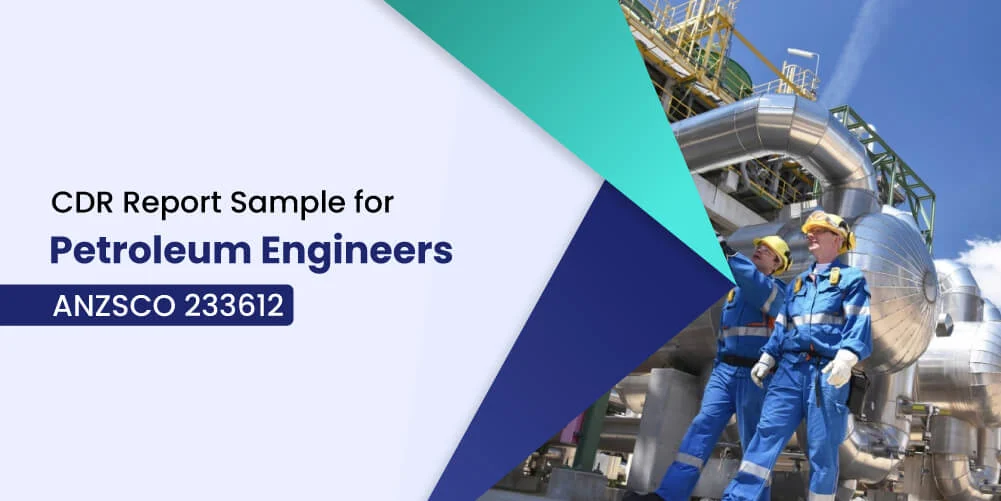PETROLEUM ENGINEER ANZSCO 233612
CDR Sample for Petroleum Engineers

Energy plays an important role in our everyday lives, from our mobile phones to our cars to our houses, it raises our standard of living. Petroleum engineers power the globe through collaboration and a pioneering mindset. Petroleum engineers can solve and grasp major challenges that will lead to energy security and are thus sought after, using science, material science, and geography.
A petroleum engineer is an engineer who deals with hydrocarbon production activities (crude oil or natural gas). If you are a petroleum engineer and want to immigrate to Australia to seek better career prospects or find a new job in your field, you can prepare a CDR report.
Australia is looking for qualified individuals in a wide range of fields to help boost its industries around the country. Therefore, competent professionals can get a plethora of chances as well as top average wages in Australia.
The CDR sample for petroleum engineers includes all required reports such as CV, continuing professional development, career episodes, and a summary statement. CDR samples for migration skills assessment provided by CDRAustraliaHelp are all approved by Engineers Australia. We have a professional team of writers to prepare your CDR report in the best way. The sample content of the CDR report is as follows:
Curriculum Vitae (CV)
Resume on the basis of a professional template.
Continuing Professional Development (CPD)
The sample of CPD clarifies the Engineering Knowledge of the applicant – 350 words.
Petroleum Engineer Career Episode Sample 1
“Technical Safety for Gas and Oil Industry” – 1685 words
Petroleum Engineer Career Episode Sample 2
“HAZID Workshop Facilitation” – 1640 words
Petroleum Engineer Career Episode Sample 3
“Predicting Hydrates Formation in Natural Gas Transportation Pipelines” – 1655 words
Petroleum Engineer Summary Statement Sample
Detailed explanation of all the competency element – 2560 words.
Petroleum Engineer Career Episode Sample 1
Project Name: Technical Safety for Gas and Oil Industry
In the first Career Episode, the author illustrates about the project titled “Technical Safety for Gas and Oil Industry”. He completed this project as a Senior Safety Engineer at G.O.G. Energy Resources Limited. His necessary responsibilities in this project were:
- Research the project by searching for periodicals on the Internet and visiting the library to study books.
- Development of advanced technology HSE deliverables.
- Serves as an interface between the company and customers on technical matters.
- Review the reports and activities of the junior engineers before they are finally transmitted to the chief engineer for signature.
- Perform management responsibilities, coordinate meetings related to the project process with team members, and discuss related work activities.
- Conduct risk assessment seminars such as HAZID, HAZOP, SIL, SCE seminars, etc.
- Preparation of proposals, project cost estimates, calculations, project schedules and business development.
Petroleum Engineer Career Episode Sample 2
Project Name: HAZID Workshop Facilitation
In the second Career Episode, the author detailed the project he performed as Senior Technical Safety Engineer at G.O.G. Energy Resources Limited. The project title was “HAZID Workshop Facilitation” and his responsibilities were:
- To review the documents of the client and obtain sufficient information to conduct the project.
- To find the possible main accident hazard that might happen at the time of operations of the offshore facilities.
- To find and assess the several parameters by using existing models.
- To provide the recommendations to develop ALARP for the sufficient existing controls.
- To develop input for Register of Hazard and Risk.
Petroleum Engineer Career Episode Sample 3
Project Name: Predicting Hydrates Formation in Natural Gas Transportation Pipelines
In the third Career Episode, the author discussed his involvement in the project “Predicting Hydrates Formation in Natural Gas Transportation Pipelines” that he undertook during the Bachelor of Science in the Department of Petroleum and Gas Engineering. His major responsibilities were:
- Review and analyze effective techniques for predicting the formation of hydrates.
- Summarize measures to prevent gas formation.
- Generates a gas hydrate phase envelope from the initial conditions.
- Write a FORTRAN program to calculate the hydrate formation pressure at a specified temperature.
- Analyzes the results and provides valid conclusions on the effectiveness of the technology applied in the project.
Free Consultation
Our Features
Many clients have received a positive approval. Hurry up and connect with us now!

